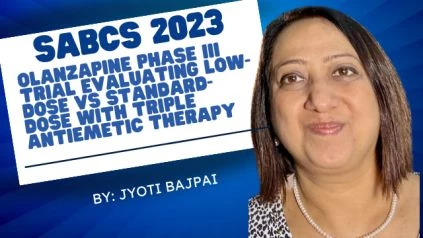By: Joyti Bajpai, MD
Date: 12/07/2023
In a forthcoming interview, Jyoti Bajpai, MD, a renowned expert in the field, will explore the nuances of the Olanzapine-3 study, focusing on the comparison between low-dose and standard-dose Olanzapine in triple antiemetic therapy for highly emetogenic chemotherapy in solid tumor patients.
-
Dr. Bajpai will provide insight into the significance of the Olanzapine study, shedding light on the impact of the combination therapy involving Olanzapine on complete response rates in patients undergoing highly emetogenic chemotherapy regimens. The interview will explore the potential breakthroughs this study presents for improving patient outcomes.
-
The discussion will pivot towards the combination of Olanzapine, a 5-HT3 antagonist, dexamethasone, and an NK1 receptor antagonist. Dr. Bajpai will compare this novel combination to existing antiemetic strategies, unraveling its implications for clinical practice. The focus will be on how this combination demonstrates a higher proportion of patients experiencing no vomiting or significant nausea, revolutionizing antiemetic approaches.
-
Chemotherapy-induced nausea and vomiting (CINV) remains a significant concern for patients. Dr. Bajpai will elucidate how the Olanzapine-containing regimen addresses these concerns, emphasizing its role in achieving a more comprehensive antiemetic prophylaxis. The interview will explore the potential improvements in the overall patient experience during chemotherapy.
-
Delving into the safety profile of low-dose Olanzapine, particularly in contrast to the standard dose, Dr. Bajpai will discuss the study’s findings that suggest Olanzapine was well-tolerated with fewer intervention-related adverse events, notably reduced daytime sleepiness. The conversation will extend to how this enhanced tolerability might positively impact the overall quality of life for patients undergoing chemotherapy.
-
Dr. Bajpai will provide valuable insights into the timing and duration of the antiemetic regimen, exploring the differences in response rates between the two Olanzapine groups within specific time slots following chemotherapy. The interview will touch upon the considerations clinicians should take into account when implementing this approach in practice, shedding light on the nuanced aspects of administration and duration that contribute to observed outcomes.
This interview promises to be an exploration of the Olanzapine-3 study, offering a deeper understanding of its implications for enhancing the management of highly emetogenic chemotherapy in solid tumor patients.

